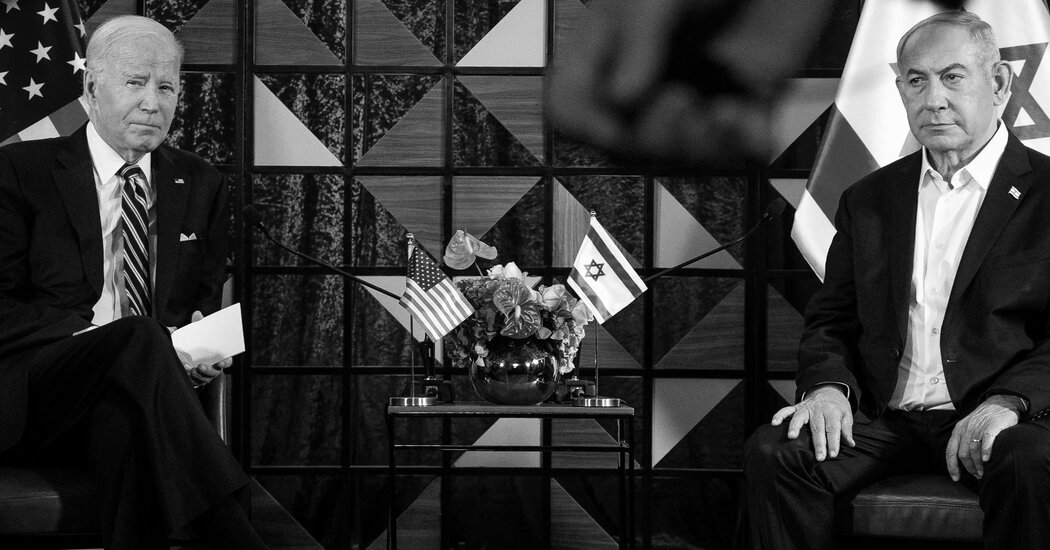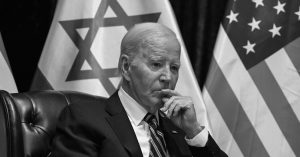
To win the war, defeat Hamas and stop settlements
The Gaza Strip Crisis: Just How Israel Got It Wrong During the First 9/11 Israeli Prime Minister and the U.S. Ambassador to Israel
The blast at the hospital in Gaza occurred hours after Biden arrived in Israel. During his visit, the president said it was important for him to “personally come” as a signal of U.S. support for Israel. He told Israeli Prime Minister Benjamin Netanyahu that “Americans are grieving with you, they really are. And Americans are worried.”
Many Americans understand, the president said. “You can’t look at what has happened here to your mothers, your fathers, your grandparents, sons, daughters, children, even babies and not scream out for justice. Justice needs to be done. But I caution this — while you feel that rage, don’t be consumed by it. We were enraged in the United States after 9/11. We made mistakes even though we wanted justice and got justice.
The president was referring to Israel’s response in the Gaza Strip to the Oct. 7 Hamas attacks that killed more than 1,400 Israelis, with about 200 kidnapped and held hostage.
There have been ongoing airstrikes, and preparations for an expected ground assault on Gaza that is sure to kill many Palestinian civilians — inflaming tensions on the West Bank and around the region. More than 3,400 people were killed in Israel’s attacks on Gaza and more than 12,000 were injured, says the Palestinian Ministry of Health.
A decade after a Six-Day war between Israel and its Arab neighbors, Egypt, Jordan and Syria, the United States attempted to foster peace in the region. In that war, Israel occupied Syria’s Golan Heights and Egypt’s Sinai Peninsula — losses those countries fought unsuccessfully to reverse in the 1973 Yom Kippur War.
Carter and his secretary of state, Cyrus Vance, aimed to accomplish Arab recognition of Israel’s right to exist, Israel’s withdrawal from territories it had occupied since the end of the Six-Day War, a guarantee that Israel’s security would not be threatened and securing an undivided Jerusalem.
“For the first three days,” Carter recalled, “I attempted to have Begin and Sadat come together. The two men were totally incompatible…shouting, banging on the table, stalking out of the rooms. They didn’t see each other for the next 10 days. We worked to keep them out of one another.
The PLO was officially recognized by Israel as representative of the Palestinian people and a partner in future negotiations. The establishment of a Palestinian authority in the West Bank and Gaza Strip would take five years.
In doing so, the leader of Israel blatantly acted against U.S. interests. He was willing to destabilize America’s allies, Jordan and Egypt, to pursue more settlements. If the pact meant stopping settlements, he would risk America’s biggest diplomatic achievement. He hasn’t shown willingness to stop settlements to get a breakthrough with Saudi Arabia.
However, separate from the Camp David Accords, a peace treaty between Israel and Egypt, signed in Washington, D.C., on March 26, 1979, is the lasting legacy of Carter’s efforts, says James Hershberg, a professor of history in international affairs at George Washington University.
Despite the assassination of Sadat by Islamic extremists in Cairo in 1981, peace has continued between Israel and Egypt. Many in the Islamic world were happy that Sadat had been killed because he was traitor for having made peace with Israel.
He betrayed the Palestinian cause at the Maryland summit meeting and was considered a traitor and an outcast by most Arabs by 1981, according to Bruce Riedel.
Bush, like President Donald Trump later, believed that strong U.S. support for Israel was enough to give it “the confidence to make significant concessions to the Palestinians and peace [would] become possible,” Altman says.
Bush’s secretary of state spent months trying to bring representatives of the Arab nations together with Israel, eventually getting Egypt, Syria, and Lebanon to attend talkshosted by Spain and the United States and the Soviet Union. A joint Jordanian-Palestinian delegation was also present.
However, Israeli Prime Minister Yitzhak Shamir gave no ground. Shamir “refused everything and he never offered anything,” Altman says. “Baker is considered a genius for bringing Madrid together, and he did work very hard for it — but all he got was a meeting.”
President Bill Clinton, although largely focused on U.S. domestic issues — particularly in his first term — nonetheless hoped that his administration could pick up the pieces of the Camp David Accords, including finding a two-state solution that would satify both Israel and the Palestinians.
Clinton thought it was better to try to bring Israel and Syria together, rather than pull back from the West Bank as the Palestinians wanted, according to the State.
The agreement was signed in the US a month after the talks ended. A famous photo of Clinton presiding over a handshake between the two men was taken at the signing ceremony.
The Two-State Solution to the Palestinian Intifada and the War on Hamas: The First Thirty Years of the War of the Oslo Peace Agreement
The PLO, in turn, renounced terrorism and recognized Israel’s right to exist in peace, bringing an end to the Palestinians’ first Intifada or uprising against Israel that had begun in 1987 — and spawned a more radical offshoot of the PLO, known as Hamas.
It seemed like significant progress, but the spirit of the agreement was quickly undone, Hershberg says. And almost immediately, the “two-state solution” began unraveling.
A 1994 attack on a mosque in Hebron, carried out by an American Jewish settler on the West Bank, caused Palestinian sentiments to boil. Then came the 1995 assassination of Rabin by an Israeli settler opposed to the agreement. Rabin’s death marked a symbolic collapse of the Oslo Accords.
“Rabin’s assassination in 1995 pretty much put an end to those hopes” for peace, says Patrick Maney, a retired Boston College history professor and author of Bill Clinton: New Gilded Age President.
He says that Arafat didn’t want to go to Camp David because he didn’t think they were prepared enough or he didn’t want peace.
“A lot of people on the Clinton team, they said this was close,” Maney says. Arafat had said no andBarak had said yes. And so Clinton really blamed Arafat. … There is some, I have to say, dispute about that in retrospect.”
The al-Qaida attacks of Sept. 11, 2001, and the subsequent “war on terror” so preoccupied the administration of President George W. Bush that Middle East peace efforts were put on hold.
Obama’s first trip as president to the region, in June 2009, was to Egypt, where he delivered a speech aimed at reassuring the Muslim world that “America and Islam are not exclusive and need not be in competition.” His first trip to Israel as president came in the year 2013)
“It’s a common belief that Obama made two big mistakes,” Altman says. “The first one was going to Egypt first thing and not stopping off in Israel. The second was demanding a freeze on [Israeli] settlements” in the West Bank.
In 2020, President Trump announced “the dawn of a new Middle East” at a White House ceremony after signing the Abraham Accords, a pair of agreements that normalized relations between Israel and several Arab states.
Hershberg says that the deal was a fear of Iran and Shiite countries as opposed to any acceptance of Israel’s legitimacy.
At Biden’s urging, Israel agreed to allow some aid into Gaza and the U.S. announced $100 million in humanitarian aid for Palestinians in Gaza and the West Bank.
The impact of his visit will be judged by history but it seems likely that the involvement of U.S. presidents in trying to foster Middle East peace will continue even as goals change.
Susan Glasser spoke on NPR’s All Things Considered about the failure of the great dream of so many American presidents, that there was a viable two- state solution to be negotiated.
Hershberg says that may be true for the time being, and for the foreseeable future. “If anything is ever going to happen, the U.S. role is certain to be necessary.” he said.
Operation Save Our Hostages: The American Way through a Regime of Israeli-Israeli Interaction in the First Five Days of the Gaza War
Netanyahu has a very bad strategy right now, he wants to eliminate Hamas in Gaza and build settlements in the West Bank, which will destroy the only viable alternative to Hamas in Palestine.
Because in the first week of this war the Supreme Leader of Iran and the leader of the Hezbollah militia in Lebanon, Hassan Nasrallah, appeared to be keeping very tight control on their militiamen both on the border with Israel and in Iraq, Syria and Yemen. The U.S. officials have picked up on some indications that the Israelis and Americans might allow their forces to attack each other if the United States intervenes.
Have not doubt: the possibility of a regionwide war that could draw the United States in is much greater today than it was five days ago, senior U.S. officials told me. As I write on Thursday night, The Times is reporting that a U.S. Navy warship in the northern Red Sea on Thursday shot down three cruise missiles and several drones launched from Yemen that the Pentagon said might have been headed toward Israel. pro-Iranian militias are likely to have launched missiles at U.S. forces in Iraq and Syria.
Iran can use its proxies to hit Israel but Israel will not allow them to fire a missile directly at Tehran. If that happens, anything can happen. Israel is believed to have submarines in the Persian Gulf.
Even if Israel acts with great care to prevent civilian deaths in Gaza, it won’t affect the situation. Think of what happened at Gaza City’s Ahli Arab Hospital on Tuesday.
The Palestinian Islamic Jihad achieved more this week with an apparently misfired rocket than it did in the previous week, as was reported by the Israeli columnist Nahum Barnea.
I believe Israel would be better off framing an operation to destroy the Hamas in Gaza as “Operation Save Our Hostages” instead of “End- Hamas-once-and-for-all” and use surgical strikes and special forces to get them.
Where I have a vote — just one — is in America. The president, in his prime-time speech Thursday night, vowed to ask Congress for an additional $14 billion in assistance for Israel to get through this war, along with an immediate injection of $100 million in new funding for humanitarian assistance to Palestinians in Gaza and the Israeli-occupied West Bank.
If Israel needs weapons to protect itself from Hamas and Hezbollah, by all means ship them. Broader economic aid for Israel should only be given if Israel stops building new settlements outside the settlement blocs, the territory immediately around them and one more brick. Netanyahu has an agreement with his coalition to annex the whole of the West Bank.
I am aware that Hamas has been against eliminating the Jewish state since it was founded and not because Israel expanded settlements in the West Bank. But if Israel has any hope of nurturing a Palestinian leadership that could replace Hamas in Gaza in the long term and be an effective partner for a two-state solution, then the settlement project has to stop and it has to stop now.
Without those two sets of conditions being met, there’s no future for moderation in this corner of the world, no chance of a sustainable peace and no chance of normalization between Israel and Saudi Arabia — no matter if Israel eliminates every single Hamas leader, foot soldier and rocketmaker or no matter how sympathetic one might be to the Palestinian cause.
So no, we’re not telling Netanyahu what to do in Gaza — Israel is a sovereign country. We are a nation that is also a republic and so we are just going to tell him what we will not do anymore.
Israel has been indirectly funded by America, and I am talking about settlements. Netanyahu did something in June of last year. To buy off the ultra-Orthodox parties he needs in his coalition to keep himself out of jail on corruption charges, Netanyahu’s government gave the ultra-Orthodox and the settlers “an unprecedented increment in allocations … including full funding of schools to not teach English, science and math,” explained Dan Ben-David, a macroeconomist who has focused on the interaction between Israel’s demography and education at Tel Aviv University, where he heads the Shoresh Institution for Socioeconomic Research. “This budgetary increment alone is more than Israel invests each year in higher education altogether — or 14 years of complete funding for the Technion, Israel’s M.I.T.,” Mr. Ben-David said. “It is completely nuts.”
If this is the season of war, it also has to be a season for answers about what happens the morning after. I am hardly the only who wants to know. Yuval Noah Harari wrote about Netanyahu’s government in an essay, stating if it dreamed of annexing territories, forcefully reestablishing borderlines, expel populations, censor speech, or turn Israel.

